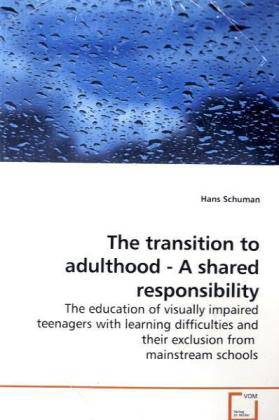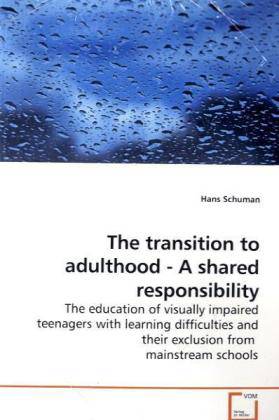
- Afhalen na 1 uur in een winkel met voorraad
- Gratis thuislevering in België vanaf € 30
- Ruim aanbod met 7 miljoen producten
- Afhalen na 1 uur in een winkel met voorraad
- Gratis thuislevering in België vanaf € 30
- Ruim aanbod met 7 miljoen producten
Zoeken
The transition to adulthood - A shared responsibility
The education of visually impaired teenagers with learning difficulties and their exclusion from mainstream schools
Hans Schuman
Paperback | Engels
€ 77,95
+ 155 punten
Omschrijving
This book presents a critical review of a five year research project which aimed at developing an empowering curriculum for visually impaired teenagers with learning difficulties. Based on a growing body of literature, four approaches were identified to support the educational practitioners to evolve into change agents who assume collective responsibility and ownership for the change process: the ideas of the learning organization, the social model of disability, McClelland s model of the iceberg, and making use of a discussion technique called intervision. Participatory action research, with its focus on emancipation through collective, informed and democratic action, provided the necessary framework to integrate these four approaches and to inform,underpin and guide the change process. An important conclusion is that teenage students with challenging multiple disabilities and learning difficulties are capable, when they are allowed, challenged and taught, of advocating for themselves, developing clear views about how they want to live, manage their lives and make informed decisions which best fit their personal needs and objectives.
Specificaties
Betrokkenen
- Auteur(s):
- Uitgeverij:
Inhoud
- Aantal bladzijden:
- 276
- Taal:
- Engels
Eigenschappen
- Productcode (EAN):
- 9783639195958
- Verschijningsdatum:
- 1/09/2009
- Uitvoering:
- Paperback
- Afmetingen:
- 152 mm x 229 mm
- Gewicht:
- 408 g

Alleen bij Standaard Boekhandel
+ 155 punten op je klantenkaart van Standaard Boekhandel
Beoordelingen
We publiceren alleen reviews die voldoen aan de voorwaarden voor reviews. Bekijk onze voorwaarden voor reviews.











